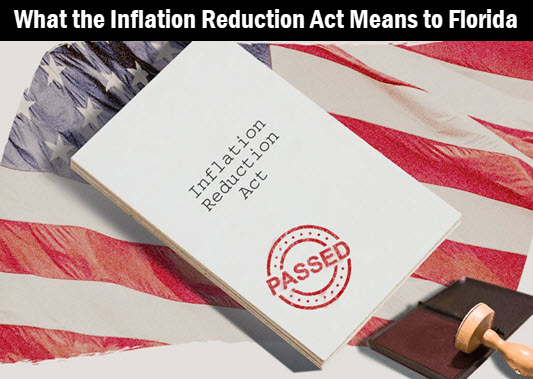Inflation Reduction Act: What It Means for Florida
August 20, 2022 05:00 am

Image via Grist | Columbia County
Observer graphic
COLUMBIA COUNTY, FL – The Inflation Reduction Act means lower costs on everything from prescription drugs, to health care premiums, to home energy costs.
The Inflation Reduction Act takes on special interests to lower costs for Floridians. The new law will lead to cleaner, more affordable home energy, lower cost prescription drugs, hundreds of dollars of savings on health care premiums, more good-paying jobs, and much more.
The Inflation Reduction Act will help save people money and grow the economy in Florida:
CUTTING PRESCRIPTION DRUG COSTS:
The Inflation Reduction Act will protect Floridians from catastrophic drug costs by capping Medicare beneficiary out-of-pocket costs at $2,000. Each year that will benefit about 113,400 Florida Medicare beneficiaries who would otherwise have out-of-pocket costs above the cap, and, for the first time, all 3.6 million Floridians with Medicare Part D will have the peace of mind of knowing their pharmacy costs are capped.
The law allows Medicare to negotiate some high-cost prescription drug prices, which will bring down the out-of-pocket costs of these drugs for Medicare beneficiaries.
The Inflation Reduction Act will require companies to pay Medicare a rebate if they increase drug prices faster than inflation, which will further reduce out-of-pocket costs for Medicare beneficiaries.
It will cap insulin copays for Medicare beneficiaries at $35 per month.
LOCKING IN LOWER HEALTH INSURANCE PREMIUMS AND EXPANDING COVERAGE:
About 543,000 more Floridians will have health insurance next year compared to without the Inflation Reduction Act.
About 2.7 million Floridians with Affordable Care Act (ACA) Marketplace coverage are saving an average of about $590 annually from the American Rescue Plan subsidies that the Inflation Reduction Act continues. This particularly helps small business owners and self-employed people, who make up 26% percent of ACA marketplace enrollment among working-age Floridians.
 LOWER
ENERGY COSTS:
LOWER
ENERGY COSTS:
The law includes rebates covering 50-100% of the cost of installing new electric appliances, including super-efficient heat pumps, water heaters, clothes dryers, stoves, and ovens. In Florida, millions of low- and moderate-income households are eligible for rebates.
Grants created by the law will help state and local governments adopt the latest building energy codes, which would save the average new homeowner in Florida 11.7% on their utility bills—$225 annually.
GOOD-PAYING JOBS:
In 2021, there were already 158,467 workers in Florida employed in clean energy jobs. The Inflation Reduction Act will expand these opportunities, bringing an estimated $62.7 billion of investment in large-scale clean power generation and storage to Florida between now and 2030.
The law provides a historic set of tax credits that will create jobs across solar, wind, storage, and other clean energy industries. These credits include bonuses for businesses that pay a prevailing wage.
DOMESTIC MANUFACTURING:
Manufacturers employ 388,200 workers in Florida, and the Inflation Reduction Act will help make the technologies of the future at home—supporting local economies and strengthening supply chains.
SMALL BUSINESSES:
Florida is home to 2.8 million small businesses, representing 99.8% of all businesses in the state, and the Inflation Reduction Act will help them save money.
Commercial building owners can receive a tax credit up to $5 per square foot to support energy efficiency improvements that deliver lower utility bills. Other programs that will benefit small businesses include tax credits covering 30% of the costs of installing low-cost solar power and of purchasing clean trucks and vans for commercial fleets.
RURAL OPPORTUNITIES:
The Inflation Reduction Act supports climate-smart agriculture practices, which will help Florida’s 47,500 farms lead on climate solutions and reward their stewardship.
Electric cooperatives, which serve about 1.2 million homes, businesses, and other customers in Florida, will for the first time be eligible for direct-pay clean energy tax credits. And this legislation dedicates investments for rural electric cooperatives to boost resiliency, reliability, and affordability, including through clean energy and energy efficiency upgrades.
-------------
Travis Reuther is the Rapid Response Director for the FL Democratic Party

 By
Travis Reuther
By
Travis Reuther